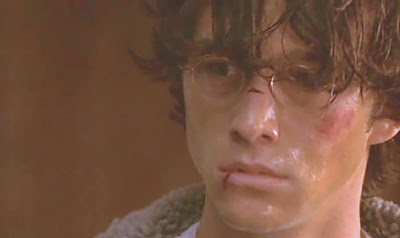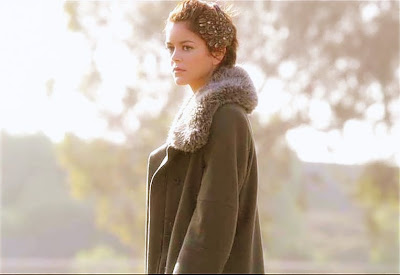 Holden: [in a letter to Justine] "Dear Justine, because of you I will be quitting the Retail Rodeo. The last two days have been the most God awful of my life. I've not been able to get rid of you in my head. I've never wanted anything so bad and I have wanted many things. I'd given up long ago on being gotten by someone else, and then you came along. The idea that I could be gotten because of circumstance or never get got is the worst feeling I've ever felt and I have felt many bad feelings. I'm sorry I can never see you again, Justine. Forgive me for being so weak, but that is who I am. Goodbye. Holden Worther. If, for some reason, you could change your mind and wanna be with me body and soul, meet me after work. I will be waiting for you at 5pm outside Chuck E. Cheese. If you are not there at 5 you will never see me again in your lifetime".
Holden: [in a letter to Justine] "Dear Justine, because of you I will be quitting the Retail Rodeo. The last two days have been the most God awful of my life. I've not been able to get rid of you in my head. I've never wanted anything so bad and I have wanted many things. I'd given up long ago on being gotten by someone else, and then you came along. The idea that I could be gotten because of circumstance or never get got is the worst feeling I've ever felt and I have felt many bad feelings. I'm sorry I can never see you again, Justine. Forgive me for being so weak, but that is who I am. Goodbye. Holden Worther. If, for some reason, you could change your mind and wanna be with me body and soul, meet me after work. I will be waiting for you at 5pm outside Chuck E. Cheese. If you are not there at 5 you will never see me again in your lifetime". "Directed by Miguel Arteta from Mike White's script, "The Good Girl" is at once romantic and snide.
"Directed by Miguel Arteta from Mike White's script, "The Good Girl" is at once romantic and snide. If "The Good Girl" were a film noir (which, in a way, it is), Holden would be the unstable femme fatale and Justine the middle-class patsy looking to crash out of a humdrum existence. This good girl is trapped in a world of crazies and idiots.
If "The Good Girl" were a film noir (which, in a way, it is), Holden would be the unstable femme fatale and Justine the middle-class patsy looking to crash out of a humdrum existence. This good girl is trapped in a world of crazies and idiots. Almost behind its own back, the story of Justine's reckless affair becomes an all-American tale of crime, violence, blackmail, obsession, and betrayal. Events take a swerve toward the serious—but not entirely. Arteta and White have created an impacted road film, or maybe an ironic outlaw ballad. The fake sincerity of the unhappy "happy ending" is clinched by Gillian Welch's twangy closing-credit rendition of the venerable bad-man ballad "Railroad Bill." It's exit music for a movie where there is none." -by J. Hoberman.
Almost behind its own back, the story of Justine's reckless affair becomes an all-American tale of crime, violence, blackmail, obsession, and betrayal. Events take a swerve toward the serious—but not entirely. Arteta and White have created an impacted road film, or maybe an ironic outlaw ballad. The fake sincerity of the unhappy "happy ending" is clinched by Gillian Welch's twangy closing-credit rendition of the venerable bad-man ballad "Railroad Bill." It's exit music for a movie where there is none." -by J. Hoberman.Source: www.Villagevoice.com
--------------------------------------------------------------------------
 "Visions of Marsha's faithlessness haunted him. Daytime fantasies of sexual abandon permeated his thoughts. And the thing was, they wouldn't understand how she really was. He, Waldo, alone understood this. He had intuitively grasped every nook and cranny of her psyche. He had made her smile. She needed him, and he wasn't there (aaahh..)
"Visions of Marsha's faithlessness haunted him. Daytime fantasies of sexual abandon permeated his thoughts. And the thing was, they wouldn't understand how she really was. He, Waldo, alone understood this. He had intuitively grasped every nook and cranny of her psyche. He had made her smile. She needed him, and he wasn't there (aaahh..) You could go anywhere in the mails.
You could go anywhere in the mails. Mr. Jameson of the Clarence Darrow Post Office rang the doorbell of the large stucco colored frame house. When Marsha Bronson opened the door, he helped her carry the package in. He had his yellow and his green slips of paper signed and left with a fifteen cent tip that Marsha had gotten out of her mother's small beige pocketbook in the den. "What do you think it is?" Sheila asked. Marsha stood with her arms folded behind her back.
Mr. Jameson of the Clarence Darrow Post Office rang the doorbell of the large stucco colored frame house. When Marsha Bronson opened the door, he helped her carry the package in. He had his yellow and his green slips of paper signed and left with a fifteen cent tip that Marsha had gotten out of her mother's small beige pocketbook in the den. "What do you think it is?" Sheila asked. Marsha stood with her arms folded behind her back.  Then smiling, "I got an idea." "What?" said Marsha. "Just watch," said Sheila, touching her finger to her head. Inside the package, Waldo was so transfixed with excitement that he could barely breathe. His skin felt prickly from the heat, and he could feel his heart beating in his throat. It would be soon. Sheila stood quite upright and walked around to the other side of the package. Then she sank down to her knees, grasped the cutter by both handles, took a deep breath, and plunged the long blade through the middle of the package, through the masking tape, through the cardboard, through the cushioning and (thud) right through the center of Waldo Jeffers head, which split slightly and caused little rhythmic arcs of red to pulsate gently in the morning sun."
Then smiling, "I got an idea." "What?" said Marsha. "Just watch," said Sheila, touching her finger to her head. Inside the package, Waldo was so transfixed with excitement that he could barely breathe. His skin felt prickly from the heat, and he could feel his heart beating in his throat. It would be soon. Sheila stood quite upright and walked around to the other side of the package. Then she sank down to her knees, grasped the cutter by both handles, took a deep breath, and plunged the long blade through the middle of the package, through the masking tape, through the cardboard, through the cushioning and (thud) right through the center of Waldo Jeffers head, which split slightly and caused little rhythmic arcs of red to pulsate gently in the morning sun."-"The Gift" (1967) a short story written by Lou Reed, it belongs to "White Light/White Heat" album by The Velvet Underground.
---------------------------------------------------------------------------------
"Most reviews of Rian Johnson's "Brick" came down to variations on these themes, and not for bad reason.
 Yes, "Brick" is a film noir—complete with slangy, speedy dialogue, murder, femmes fatale, and plot twists—transplanted to the world of high school. And yes, that's awesome. But it's not the end of the story. Some reviews caught on to the significance of the high school setting, where each emotion is outsized and every bit of drama feels like a life-or-death situation.
Yes, "Brick" is a film noir—complete with slangy, speedy dialogue, murder, femmes fatale, and plot twists—transplanted to the world of high school. And yes, that's awesome. But it's not the end of the story. Some reviews caught on to the significance of the high school setting, where each emotion is outsized and every bit of drama feels like a life-or-death situation.
 But even these reviews tended to miss the bruised, beating heart beneath the film-school cleverness of the set-up. In Johnson's story and wide, empty compositions—as well as in Joseph Gordon-Levitt's astonishing performance—lies a deep sadness specifically attuned to the worlds of both high school and film noir.
But even these reviews tended to miss the bruised, beating heart beneath the film-school cleverness of the set-up. In Johnson's story and wide, empty compositions—as well as in Joseph Gordon-Levitt's astonishing performance—lies a deep sadness specifically attuned to the worlds of both high school and film noir. Gordon-Levitt's Brendan is two types: the cold, distant hero of noir and the ultra-smart loner of high school (he "eats alone" in more ways than one). Throughout the course of the film, Brendan's solitude helps him solve the case, but he loses everything in the process.
Gordon-Levitt's Brendan is two types: the cold, distant hero of noir and the ultra-smart loner of high school (he "eats alone" in more ways than one). Throughout the course of the film, Brendan's solitude helps him solve the case, but he loses everything in the process. In this sense, "Brick" functions as a sly and intensely moving deconstruction of noir tropes. This is no celebration of Humphrey Bogart's "cool" stoicism; it's an elegy for lost souls." —Matt Noller, Athens, GA.
In this sense, "Brick" functions as a sly and intensely moving deconstruction of noir tropes. This is no celebration of Humphrey Bogart's "cool" stoicism; it's an elegy for lost souls." —Matt Noller, Athens, GA.Source: www.Avclub.com
------------------------------------------------------------------------------
"Ralph stood on the corner, leaning against the brick wall of Silver's candy store, telling himself to go home and get some sleep..."
 "You don't know what you'll be doing tonight. Or tomorrow. Or the day after tomorrow. What are you? What do you do? You stand on the corner. You're one of the bums. You're thirty years old and what do you have? "Nothing." "Is that what you want?" "It gives me very little to worry about. I don't have to think about losing it. There's nothing to lose."
"You don't know what you'll be doing tonight. Or tomorrow. Or the day after tomorrow. What are you? What do you do? You stand on the corner. You're one of the bums. You're thirty years old and what do you have? "Nothing." "Is that what you want?" "It gives me very little to worry about. I don't have to think about losing it. There's nothing to lose."-from "The Blonde on the Street Corner" (1954) by David Goodis. Books by David Goodis.